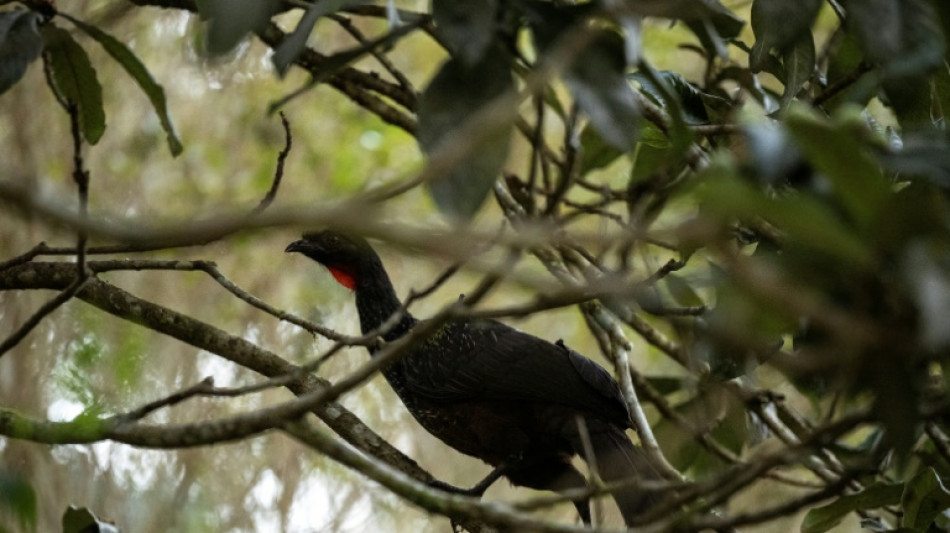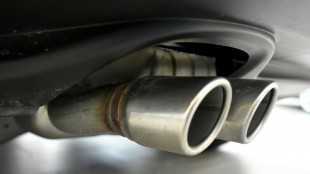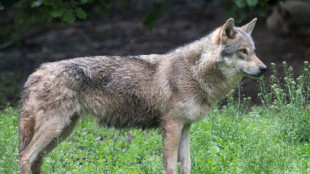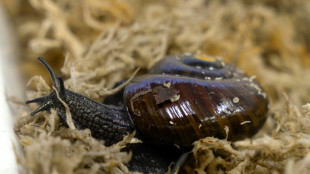
-
 Putin evokes WWII victory to rally Russia behind Ukraine offensive
Putin evokes WWII victory to rally Russia behind Ukraine offensive
-
China exports beat forecasts ahead of US tariff talks

-
 Leo XIV, the 'Latin Yankee', to celebrate first mass as pope
Leo XIV, the 'Latin Yankee', to celebrate first mass as pope
-
Most stocks lifted by hopes for US-China talks after UK deal

-
 IPL suspended indefinitely over India-Pakistan conflict: reports
IPL suspended indefinitely over India-Pakistan conflict: reports
-
German lender Commerzbank's profits jump as it fends off UniCredit

-
 Rare bone-eroding disease ruining lives in Kenya's poorest county
Rare bone-eroding disease ruining lives in Kenya's poorest county
-
India says repulsed fresh Pakistan attacks as de-escalation efforts grow

-
 Zhao's historic snooker title sparks talk of China world domination
Zhao's historic snooker title sparks talk of China world domination
-
'High expectations': EU looks to Merz for boost in tough times

-
 Poisoned guests rarely invited before deadly mushroom lunch, Australia trial hears
Poisoned guests rarely invited before deadly mushroom lunch, Australia trial hears
-
China sales to US slump even as exports beat forecasts

-
 Indian cricket to make 'final decision' on IPL over Pakistan conflict
Indian cricket to make 'final decision' on IPL over Pakistan conflict
-
Dethroned Bundesliga champions Leverkusen face uncertain future

-
 China can play hardball at looming trade talks with US: analysts
China can play hardball at looming trade talks with US: analysts
-
French monuments in trouble while PSG prepare for Champions League final

-
 Newcastle face Chelsea in top five showdown, Alexander-Arnold in spotlight
Newcastle face Chelsea in top five showdown, Alexander-Arnold in spotlight
-
Flick's Barca must show 'hunger' in crunch Liga Clasico

-
 Clasico the last chance saloon for Ancelotti's Real Madrid
Clasico the last chance saloon for Ancelotti's Real Madrid
-
Timberwolves overpower Warriors to level series

-
 Chinese fabric exporters anxious for US trade patch-up
Chinese fabric exporters anxious for US trade patch-up
-
Putin gears up to host world leaders at lavish army parade

-
 Nearing 100, Malaysian ex-PM Mahathir blasts 'old world' Trump
Nearing 100, Malaysian ex-PM Mahathir blasts 'old world' Trump
-
Leo XIV, first US pope, to celebrate first mass as pontiff

-
 Asian stocks lifted by hopes for US-China talks after UK deal
Asian stocks lifted by hopes for US-China talks after UK deal
-
Former head of crypto platform Celsius sentenced 12 years

-
 Ex-model testifies in NY court that Weinstein assaulted her at 16
Ex-model testifies in NY court that Weinstein assaulted her at 16
-
Nestlé and OMP Showcase Approach to Future-Ready Supply Chain at Gartner Supply Chain Symposium/Xpo in Barcelona

-
 Genflow Biosciences PLC Announces Share Subscription, Director's Dealing and Update
Genflow Biosciences PLC Announces Share Subscription, Director's Dealing and Update
-
Argo Blockchain PLC Announces 2024 Annual Results and Restoration of Listing

-
 'Great honor': world leaders welcome first US pope
'Great honor': world leaders welcome first US pope
-
Pacquiao to un-retire and fight Barrios for welterweight title: report

-
 Trump unveils UK trade deal, first since tariff blitz
Trump unveils UK trade deal, first since tariff blitz
-
Man Utd one step away from Europa League glory despite horror season

-
 Jeeno shines on greens to grab LPGA lead at Liberty National
Jeeno shines on greens to grab LPGA lead at Liberty National
-
Mitchell fires PGA career-low 61 to grab Truist lead

-
 AI tool uses selfies to predict biological age and cancer survival
AI tool uses selfies to predict biological age and cancer survival
-
Extremely online new pope unafraid to talk politics

-
 Postecoglou hits back as Spurs reach Europa League final
Postecoglou hits back as Spurs reach Europa League final
-
Chelsea ease into Conference League final against Betis

-
 Pope Leo XIV: Soft-spoken American spent decades amid poor in Peru
Pope Leo XIV: Soft-spoken American spent decades amid poor in Peru
-
First US pope shared articles critical of Trump, Vance

-
 'Inexcusable' - NBA champs Boston in trouble after letting big leads slip
'Inexcusable' - NBA champs Boston in trouble after letting big leads slip
-
US automakers blast Trump's UK trade deal

-
 Stocks mostly rise as US-UK unveil trade deal
Stocks mostly rise as US-UK unveil trade deal
-
Trump presses Russia for unconditional 30-day Ukraine ceasefire

-
 Anything but Europa League glory 'means nothing' for Man Utd: Amorim
Anything but Europa League glory 'means nothing' for Man Utd: Amorim
-
'Inexcuseable' - NBA champs Boston in trouble after letting big leads slip

-
 Pope Leo 'fell in love with Peru'and ceviche: Peru bishop
Pope Leo 'fell in love with Peru'and ceviche: Peru bishop
-
Pakistan's T20 cricket league moved to UAE over India conflict


From the rear end of a pheasant, Brazil's best coffee
In Brazil, the proverbial goose that lays the golden egg is in reality something closer to a pheasant that excretes coffee beans.
At the Camocim coffee farm, deep in the bucolic hills of Espirito Santo state in Brazil's southeast, jacus -- a type of pheasant native to tropical forests there -- are considered some of the most astute pickers (or rather, eaters) of coffee cherries.
"He chooses the best fruits, the ripest," said worker Agnael Costa, 23, delicately scooping up droppings left behind by one of the birds between two tree trunks.
What goes in as ripe cherries comes out as beans, which can go on to be sold as some of the most delicious -- and expensive -- coffee in the world.
The coffee at Camocim grows in the middle of the lush forest, and the jacus here are wild, eating (and defecating) at their own pace.
"It was this agroforestry system that created the necessary conditions for this exotic coffee to exist here," farm owner Henrique Sloper tells AFP.
Domestically, jacu coffee can sell for 1,118 reais per kilogram (or around $100 a pound) -- a price that can rise significantly upon export. Foreign distributors include British department store Harrods, among others.
- From enemies to allies -
The jacu, with its black feathers and red throat, wasn't always welcome at the farm. It was originally seen as a hungry pest feeding off precious crops.
But when Sloper discovered "kopi luwak," an expensive Indonesian coffee made with beans from civet excrement, he figured jacus might make good allies in the quest to make a better brew.
Kopi luwak sometimes has a bad reputation, with farmers accused of pressing civets -- small mammals similar to weasels -- into captivity to boost production.
The wild jacus at Camocim, meanwhile, roam, eat and poop at their leisure.
"It's 100 percent natural," said farm production supervisor Rogerio Lemke. "The jacu is within its own natural habitat," in Brazil's Atlantic Forest.
Linking production to the whims of a jacu's appetite is just one of the reasons it fetches such a high price.
Jacu droppings look a bit like a cereal bar, with beige grains protruding from a blackish, pasty mess. Once collected and dried, the beans are carefully sorted and hulled, and put into a chilled room.
"It is naturally expensive. There is no way to make a jacu coffee at a low cost," says Sloper.
All told, jacu coffee represents less than 2 percent of the estate's production.
The bird also carries other advantages, both for farmers and those seeking a cheaper -- if less intestinally intimate -- cup of Joe.
"It serves not only as a selector (of the best beans), but also as a harvest alarm" says Sloper. "Where it eats, the coffee is ripe."
- 'Delicious' -
While jacus help select the best coffee, there's nothing in particular about their digestive system that imparts a different taste on the beans.
"The birds have an extremely short intestinal transit time," Ensei Neto, a coffee specialist, tells AFP. "So there is not exactly any kind of biochemical process, there is no time."
Their digestive process is much faster than civets or elephants -- another animal whose dung is used, in Thailand, to produce specialty coffee.
Some think the fermentation process stemming from those animals' longer digestion times imparts a better flavor on the resulting beans.
The jacu "only goes for the ripe fruits," says Neto, producing a coffee with "sweet notes, with good acidity."
"It doesn't add anything else. But the story is good."
The jacus have found a fan in Poliana Cristiana Prego, 37, a Brazilian tourist who has come to visit Camocim.
"It's a delicious coffee and the story behind its production is very original. It's a new experience for us," she says.
"Our customers are lovers of exotic products, but also those who value the idea of sustainable development," says Sloper.
For him, "the future of coffee will come from Brazil," already the world's top producer.
Whether it comes from jacus or otherwise, Brazilian coffee "is showing the world that we really are able to do what nobody else can."
D.Kaufman--AMWN



